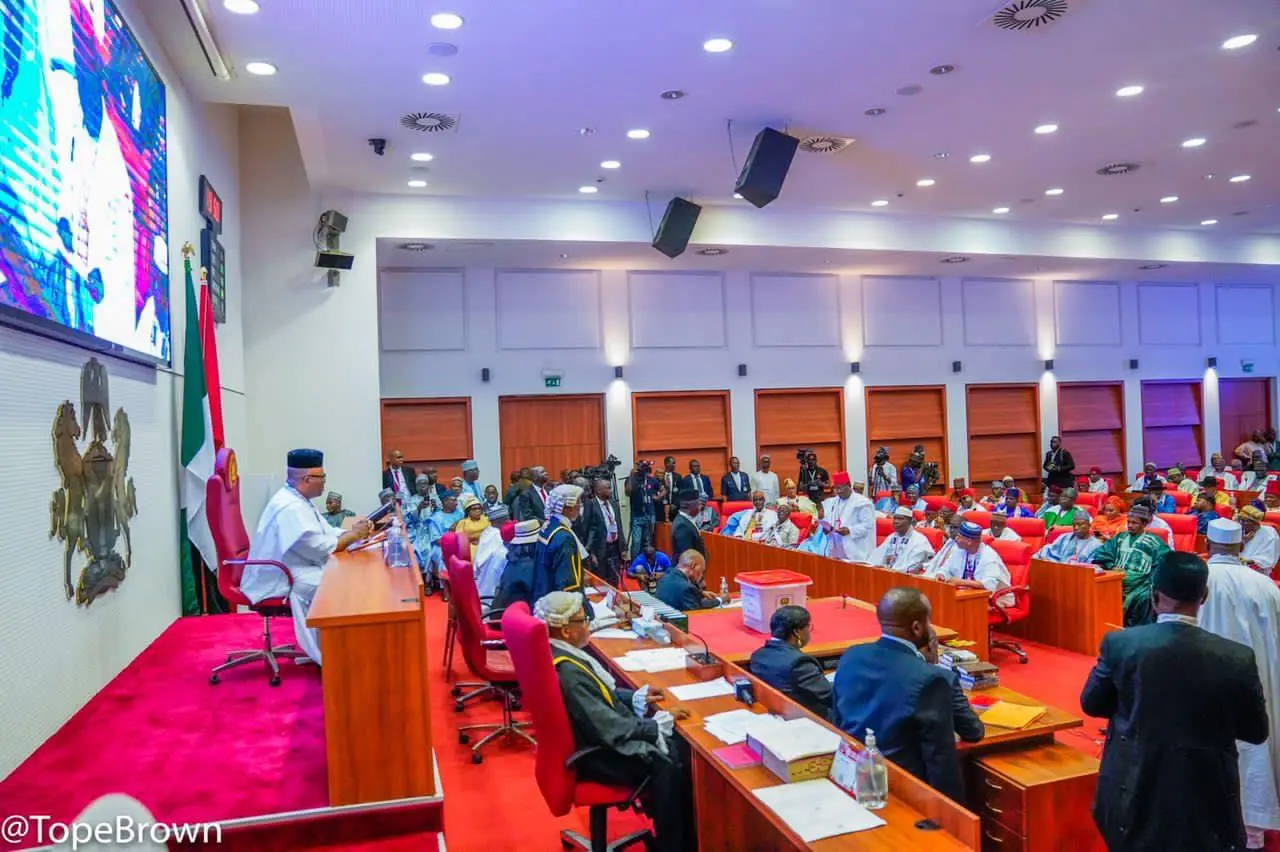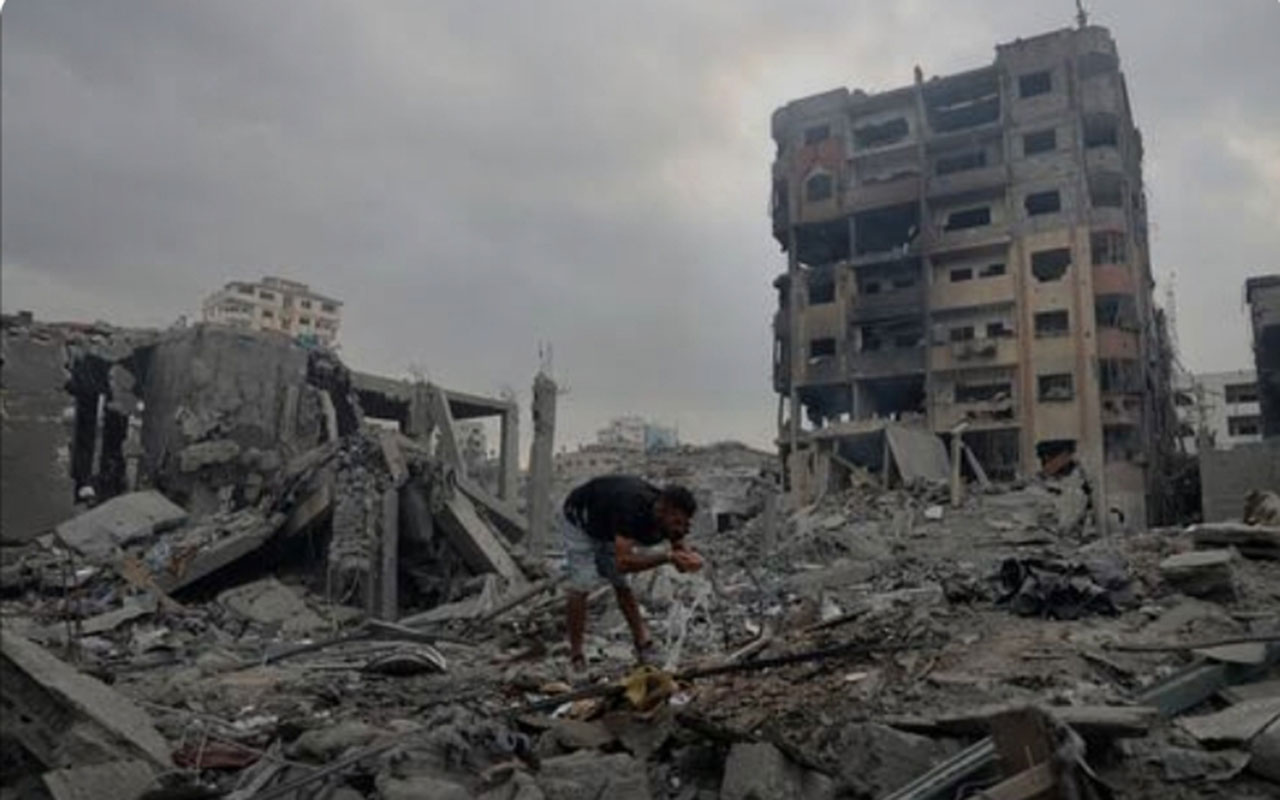
• History will judge us all, WHO chief warns over rising death toll
• Israel observes national day of mourning one month after October 7 massacre
• Hamas leader denies killing Israeli civilians
One month after the Israel-Hamas war, the Senate has asked the Federal Government to collaborate with other countries and the United Nations (UN) in calling for a ceasefire in conflict. The Nigerian government is yet to take a position on the war between Israel and Palestine.
Since October 7, the Israeli military has relentlessly bombarded Gaza when Hamas militants launched an attack that left 1,400 dead in Israel. According to the Hamas-run health ministry yesterday, the death toll in Gaza has surpassed 10,000 people — including more than 4,000 children.
Referencing the Nigerian civil war and the concomitant horror encountered by Nigerians, the Senate equally urged the UN to revisit the issue of a two-state solution as a proposed framework for resolving the Israeli-Palestinian conflict as earlier agreed by the United Nations since 1948. The two-state solution calls for establishment of an independent state for Palestinians alongside that of Israel.
In a motion moved by Senator Abdulrahman Kawu from Kano South yesterday, the Senate after an extensive debate, described the emerging figures of death and displacement from the war as horrendous. Lending their voices to the international community, the lawmakers condemned the killings on both sides while suing for peace, particularly to avoid a degeneration into World War III.
Senator Adamu Aliero (PDP, Kebbi), who presented the motion, said the casualty figures in the ongoing war were horrifying, stating that since the recent conflict started, 18 places of worship had been destroyed, 22,600 residential units damaged, 19 medical centres, 90 education facilities, 70 industrial facilities and 49 media offices razed.
He said in recent years, there has been a renewed effort to negotiate a peace settlement between Israel and the Palestinians but these talks have so far failed to produce a lasting agreement.
Kawu said if urgent steps are not taken to address the situation, the battle may spread to neighbouring countries and then to the allies of Israel and Palestine, which may further result in the loss of more lives and property.

Senators who contributed to the debate, including Barau Jibrin (Kano), Enyinnaya Abaribe (Abia) and Sani Musa (Niger), all condemned the killings on both sides and called for immediate end to the hostilities.
Deputy Senate President, Barau Jibrin, said: “What we need now is a ceasefire so that people who are being killed every day will no longer be killed. So many have lost their lives; so many children have been left orphaned.
“All you see on television about the conflict are dead bodies and so forth. This is not acceptable. All this is not good for the modern world.
“We should add our voices to those of responsible people all over the world that Palestine and Israel should come together and accept the two-state solution for permanent peace to prevail in that region of the world.”
Abaribe said “having experienced the Nigerian civil war in 1967 as a child, an eye for an eye will lead to everybody not having eyes at all. I call for an immediate ceasefire and an end to the conflict.”
This call comes 24 hours after the UN amplified the need for an urgent ceasefire, describing Gaza as a graveyard for children.
Also, yesterday, the head of the World Health Organization (WHO) urged all parties involved to agree to a humanitarian ceasefire in Gaza and “work toward a lasting peace”.
Posting to social media, the WHO director general, Tedros Adhanom Ghebreyesus, said: “How long will this human catastrophe last? History will judge us all by what we do to end this tragedy. We again call for the immediate release of the hostages.”
On Monday, Tedros joined the heads of several major UN bodies in a united call for an immediate humanitarian ceasefire in Gaza. “Enough is enough. This must stop now,” a joint statement said.

“An entire population is besieged and under attack, denied access to the essentials for survival, bombed in their homes, shelters, hospitals and places of worship. This is unacceptable,” the statement added.
Meanwhile, Israelis across the country observed a minute of silence yesterday to commemorate the victims of Hamas’s October 7 massacre. The minute of silence marked the start of memorial ceremonies across the country, but unlike Holocaust Remembrance Day and Memorial Day, it was not accompanied by a siren.
Following the silence, flags across Israel were lowered to half-staff and mourners sang the national anthem, Hatikvah.
On October 7, thousands of Hamas terrorists burst into southern Israel, slaughtering some 1,400 people in their homes, on the street and at an outdoor music festival in the deadliest terror attack in Israel’s history. Among the dead were also hundreds of soldiers and police, some killed defending communities and some in military bases that were overrun. At least 247 people, mostly civilians, were taken hostage, including young children and the infirm; four were released and one was rescued.
Prior to Tuesday’s memorial events, a Defense Ministry ceremony was held on Monday night in the State Hall of Remembrance at Mount Herzl, Israel’s largest military cemetery, where the newly engraved names of 349 people killed on October 7 were unveiled on the walls of the commemorative building. At the same time, the faces of the hostages held in Gaza were projected across the walls of Jerusalem’s Old City.
For the Hamas-run health ministry in Gaza, it claimed that 10,328 Palestinians have been killed within the Gaza Strip by Israeli military actions since 7 October. The number, it says, includes 4,237 children. The number of people wounded has been increased to 25,965, according to the health ministry spokesperson, Dr Ashraf al-Qudra.
In the statement, the health ministry also said that it appealed for international intervention to prevent the bombing of hospitals. Al-Qudra also claimed that Israel had turned the evacuation corridors it had announced into traps for the displaced.
The Israeli military has repeatedly called for Gazan residents to move to the south of the territory, while continuing to bombard the southern cities of Rafah and Khan Younis. It has not been possible for journalists to independently verify the casualty figures being issued in Gaza.
A senior Hamas leader has refused to acknowledge that his group killed civilians in Israel, claiming only conscripts were targeted. Moussa Abu Marzouk told the BBC that “women, children and civilians were exempted” from Hamas’s attacks. This is in contrast to the wealth of evidence of Hamas men shooting unarmed adults and children.
The proof includes video from Hamas body cameras and first-hand testimony given to international news networks.
Marzouk, the group’s deputy political leader, who is subject to an asset freeze in the UK under counter-terrorism regulations, was interviewed in the Gulf. He is the most senior member to speak since the October 7 atrocities.

On the scores of hostages being held inside the territory, he said that they were not able to be freed while Israel was bombing Gaza. The Hamas-run health ministry says 10,000 people have been killed since Israel started operations last month. “We will release them. But we need to stop the fighting,” he said.
Yesterday, Israel’s Prime Minister, Benjamin Netanyahu, said he would consider “tactical little pauses” in Gaza fighting to facilitate the entry of aid or the exit of hostages, but again rejected calls for a general ceasefire.
Marzouk recently travelled to Moscow to discuss eight Russian-Israeli dual citizens snatched on October 7 by Hamas, a proscribed terror organisation in many countries including the UK and America. He said Hamas members in Gaza had “looked for and found two female hostages” from Russia but were unable to release them because of the conflict.
They could only realistically release hostages, he said, if “the Israelis stop the fighting so we can hand them over to the Red Cross”.
Marzouk claimed that Mohamed el-Deif, the leader of Hamas’s Qassam Brigades military wing, had ordered his men to spare civilians.
“El-Deif clearly told his fighters ‘don’t kill a woman, don’t kill a child and don’t kill an old man’,” he said.






